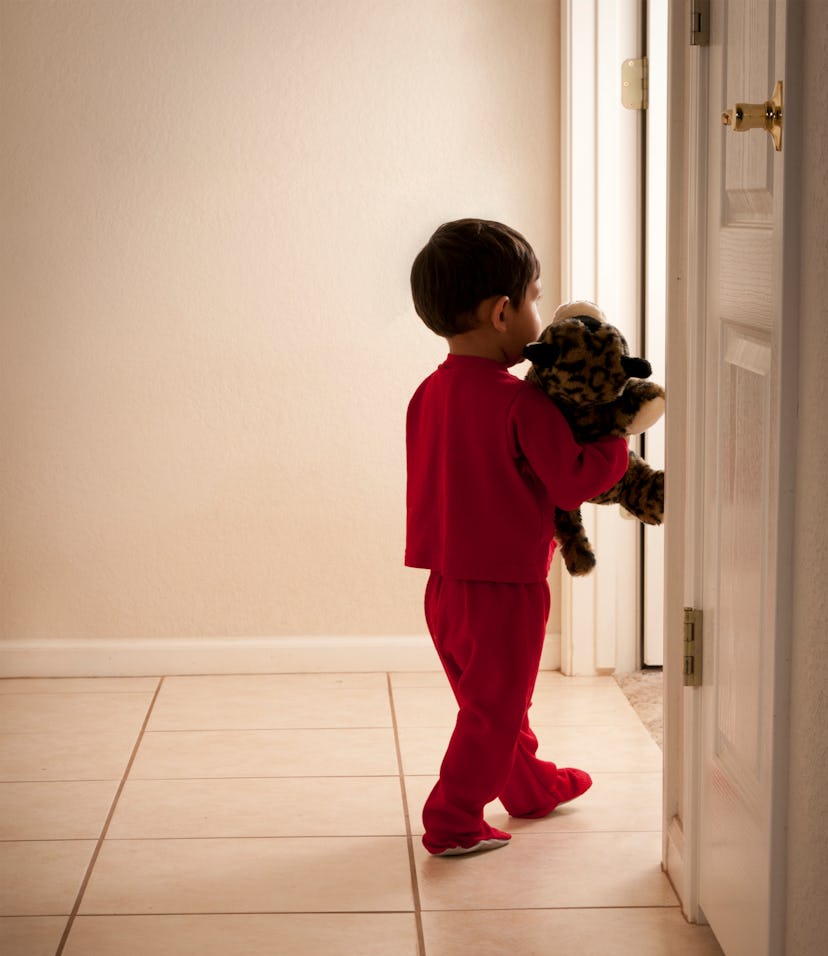Toddler

Everything You Need To Know About Your Sleepwalking Toddler
Regardless of why your toddler is getting up, experts say it's important to understand the safety aspects at play.
When you have a toddler who sleepwalks, it can be unsettling to think about your young child wandering around the house alone at night, so you likely want to prevent it from continuing. But, knowing how to stop sleepwalking in toddlers starts with understanding the reasons that your toddler might be sleepwalking in the first place.
Why Toddlers Sleepwalk
"It's not very common for toddlers to sleepwalk, but when they do, it can range from simply sitting up in bed to walking around their room or the house, unaware of their surroundings," sleep consultant Christine Stevens tells Romper. "While it's common for children to wake up in the middle of the night, sleepwalking may be brought on by lack of sufficient sleep, an inconsistent sleep schedule, unfamiliar sleep locations, and even a family history of sleepwalking."
Toddlers are notorious for waking up groggy in the middle of the night and toddling half-asleep into their parent's room — my kids have scared the daylights (or nightlights?) out of my snoozing self more times than I can count. So how is this different from sleepwalking?
"Toddlers often come to find a parent at night in this confused state if they still need a parent in their room in order to fall asleep at bedtime," pediatric sleep psychologist Lynelle Schneeberg, Psy.D. tells Romper. "In this case, the parent becomes a 'sleep crutch' for the child and when the child wakes at night, as all children do, the child will come to find his/her sleep crutch again in order to get back to sleep. The child may seem confused and not fully awake while they walk to their parents' bedroom, but this is different from actual sleepwalking."
Sleepwalking Vs. Waking In The Night
It's important for parents to distinguish what is actually happening when they notice their toddler is up and moving at night. Schneeberg recommends that "a parent might think about whether the child sleepwalks if the parent does not leave the child's room after s/he falls asleep at bedtime. In other words, does the child sleepwalk only when they do not co-sleep?"
If this is the case, Schneeberg recommends that parents help toddlers learn to fall asleep independently by establishing a solid bedtime routine. You can also work to slowly make your way out of the room at bedtime by incrementally decreasing the amount of time you spend with your toddler as they fall asleep.
If your toddler is actually sleepwalking (not just waking up to come and find you), you may not be able to stop it, per se, but there are ways to help them. "If you know or suspect your toddler is sleepwalking, first ensure that he or she is getting the right amount of sleep, usually about 12 to 13 hours per day, for kids up to 5 years old," Stevens recommends.
Dangers Of Sleepwalking
Additionally, safety is of the utmost importance. "Sleepwalking in itself isn't dangerous; what can be dangerous is having a sleeping child walking around your house in the middle of the night," Stevens explains. "Beyond the obvious tripping hazards, there are many reasons we wouldn't want a sleeping child walking around in a dark house where they could be injured."
My sister was a sleepwalker as a child. While she did eventually outgrow the condition, it was pretty frightening to think about the possibility of her walking out of our front door in the middle of the night or falling face-first into something hard like the corner of our brick fireplace. Parents of toddlers who sleepwalk may face similar concerns.
"There are several dangers associated with actual sleepwalking," Schneeberg says. "A child may try to leave the home or fall down the stairs or trip in a cluttered hallway. Some children even try to climb up on furniture or counters to get food or some other items."
Safety Precautions If Your Toddler Sleepwalks
Schneeberg stresses the importance of parents taking proper safety precautions if they have a sleepwalker in the house. She recommends things like motion sensors, door alarms, and bed alarms to alert parents when their child is out of bed at night, as well as securing home exit points with deadbolts that are out of reach of the child and installing safety gates on stairways.
Stevens also adds that "most kids grow out of sleepwalking with time," but if your child is sleepy during the day, it's worth a call to your pediatrician to rule out medical issues and help establish a regular sleep schedule.
Experts:
Lynelle Schneeberg, Psy.D., pediatric sleep psychologist, author of Become Your Child’s Sleep Coach, and American Academy of Sleep Medicine fellow
Christine Stevens, children's sleep consultant and owner of Sleep Solutions by Christine
This article was originally published on